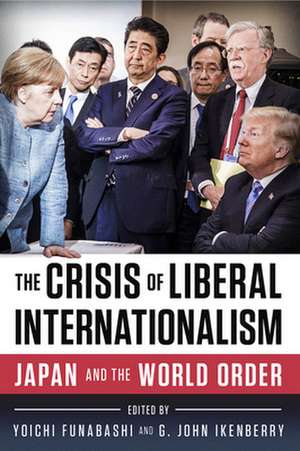The Crisis of Liberal Internationalism
Editat de Yoichi Funabashi, G. John Ikenberryen Limba Engleză Paperback – 4 feb 2020
Preț: 365.81 lei
Nou
Puncte Express: 549
Preț estimativ în valută:
70.00€ • 74.85$ • 58.36£
70.00€ • 74.85$ • 58.36£
Carte tipărită la comandă
Livrare economică 17 aprilie-01 mai
Preluare comenzi: 021 569.72.76
Specificații
ISBN-13: 9780815737674
ISBN-10: 081573767X
Pagini: 416
Ilustrații: 5 illustrations
Dimensiuni: 152 x 229 x 24 mm
Greutate: 0.67 kg
Editura: Brookings Institution Press
ISBN-10: 081573767X
Pagini: 416
Ilustrații: 5 illustrations
Dimensiuni: 152 x 229 x 24 mm
Greutate: 0.67 kg
Editura: Brookings Institution Press
Cuprins
Contents:
Preface, Yoichi Funabashi
Introduction Japan and the Liberal International Order, Yoichi Funabashi and G. John Ikenberry
Part I: Foreign Policy
1. Proactive Stabilizer: Japan's Role in the Asia-Pacific Security Order, Adam P. Liff
2. Follower No More?: Japan's Leadership Role as a Champion of the Liberal Trading Order, Mireya Solís
3. Reformist Status Quo Power: Japan's Approach toward International Organizations, Phillip Y. Lipscy
4. Universality to Plurality?: Values in Japanese Foreign Policy, Maiko Ichihara
5, Atoms for Alliance Challenges: Japan on the Liberal International Nuclear Order, Nobumasa Akiyama
Part II: Statecraft
6. Japan's Homogenous Welfare State: Development and Future Challenges, Akihisa Shiozaki
7. Winds, Fevers, and Floating Voters: Populism in Japan, Ken Victor Leonard Hijino
8. Japan's Incomplete Liberalism: Japan and the Historical Justice Regime, Thomas Berger
9. The Perils and Virtues of Constitutional Flexibility: Japan's Constitution and the Liberal International Order, Kenneth Mori McElwain
10. The Silent Public in a Liberal State: Challenges for Japan's Journalism in the Age of the Internet, Kaori Hayashi
11. Japan and the Liberal International Order: A Survey Experiment, Adam P. Liff and Kenneth Mori McElwain
Contributors
Index
Preface, Yoichi Funabashi
Introduction Japan and the Liberal International Order, Yoichi Funabashi and G. John Ikenberry
Part I: Foreign Policy
1. Proactive Stabilizer: Japan's Role in the Asia-Pacific Security Order, Adam P. Liff
2. Follower No More?: Japan's Leadership Role as a Champion of the Liberal Trading Order, Mireya Solís
3. Reformist Status Quo Power: Japan's Approach toward International Organizations, Phillip Y. Lipscy
4. Universality to Plurality?: Values in Japanese Foreign Policy, Maiko Ichihara
5, Atoms for Alliance Challenges: Japan on the Liberal International Nuclear Order, Nobumasa Akiyama
Part II: Statecraft
6. Japan's Homogenous Welfare State: Development and Future Challenges, Akihisa Shiozaki
7. Winds, Fevers, and Floating Voters: Populism in Japan, Ken Victor Leonard Hijino
8. Japan's Incomplete Liberalism: Japan and the Historical Justice Regime, Thomas Berger
9. The Perils and Virtues of Constitutional Flexibility: Japan's Constitution and the Liberal International Order, Kenneth Mori McElwain
10. The Silent Public in a Liberal State: Challenges for Japan's Journalism in the Age of the Internet, Kaori Hayashi
11. Japan and the Liberal International Order: A Survey Experiment, Adam P. Liff and Kenneth Mori McElwain
Contributors
Index
Descriere
Outlines today's challenges to the liberal international order, proposes a role for Japan to uphold, reform and shape the order, and examines Japan's assets as well as constraints as it seeks to play the role of a proactive stabilizer in the Asia-Pacific.
